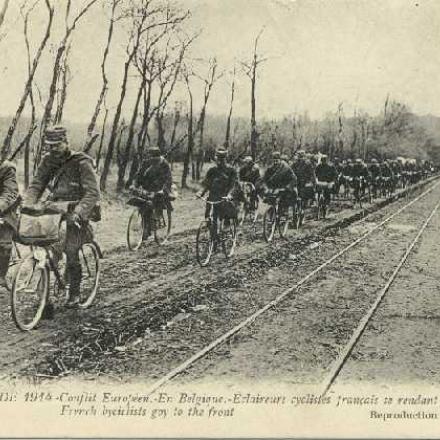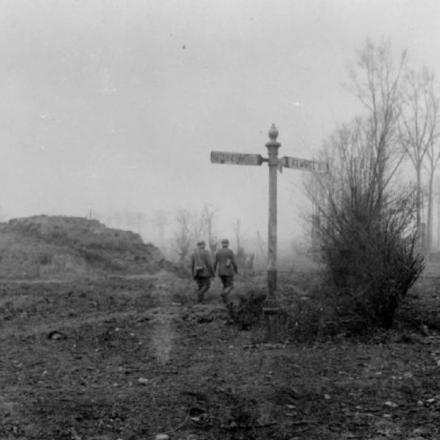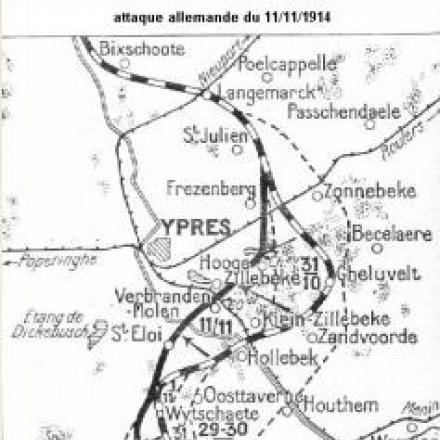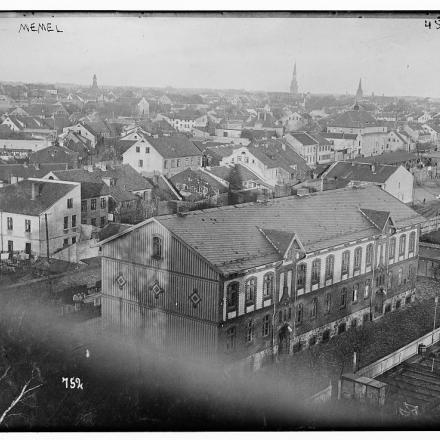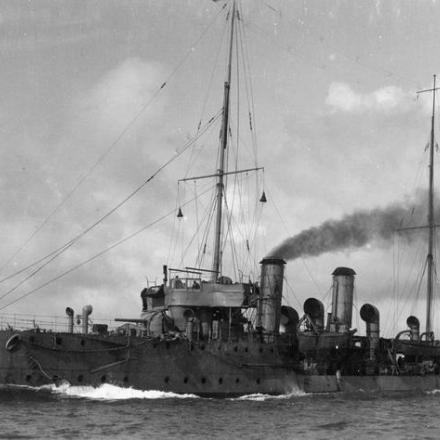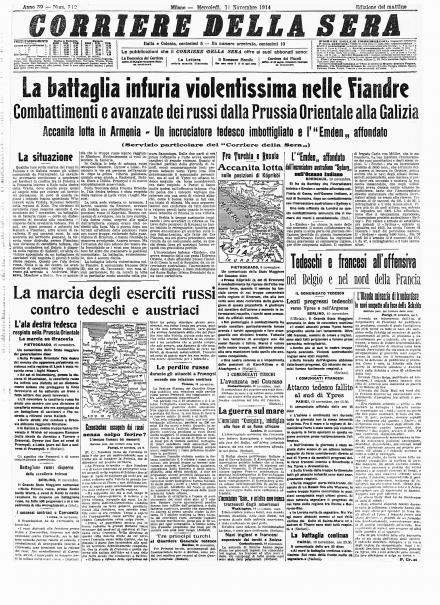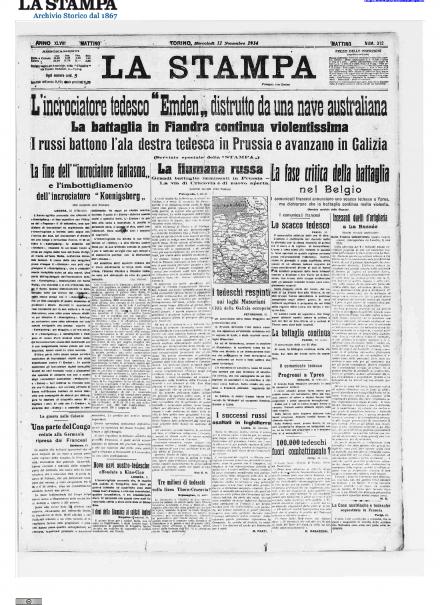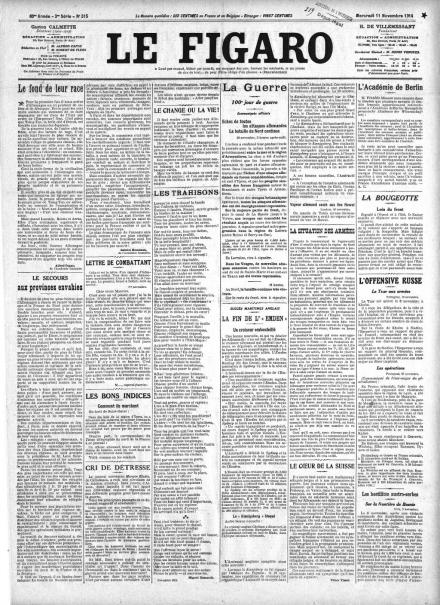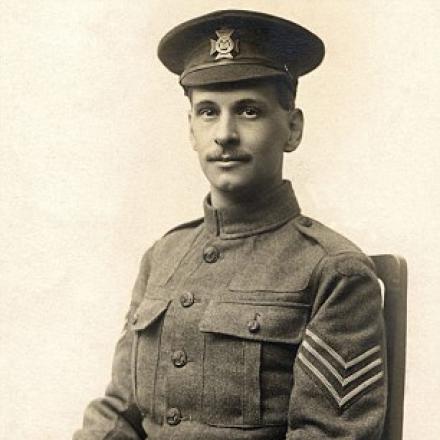La Guardia prussiana contro Ypres
A Londra Re Giorgio interviene in Parlamento: c’è da approvare i nuovi crediti di guerra. Nulla di complicato, non c’è niente in grado di appianare le divergenze politiche quanto un conflitto mondiale. Il sovrano non si lascia sfuggire l’occasione e ringrazia pubblicamente i sudditi di fede musulmana: nessuno ha tradito l’impero, nonostante l’intervento turco.
Sul fronte occidentale la Germania affida alla Guardia prussiana il compito di espugnare Ypres. La carica dell’11 novembre segue un bombardamento terrificante: mai l’artiglieria aveva eruttato una simile quantità di fuoco. Le linee britanniche vacillano, i tedeschi le penetrano, ma non dura. A fine giornata vengono respinti indietro. Quanto abbiano sofferto gli Alleati è però lampante: hanno combattuto persino autisti e cuochi, chiunque fosse in grado di imbracciare un’arma ha fatto la sua parte.
Un migliaio abbondante di chilometri più a est le armate zariste continuano ad avanzare in lungo tutto il fronte, dalla Prussia orientale alla Slesia, fino in Galizia. Una fiumana. Ma a Pietrogrado si sottovaluta la capacità di reazione tedesca. Il Generale Hindenburg sta organizzando una massiccia controffensiva, ancora sulla Vistola: al contrario delle apparenze, di passare l’inverno sulla difensiva non se ne parla, lo spazio di manovra c’è.
Davide Sartori
GLI AVVENIMENTI
Politica e società
- Gran Bretagna: seduta del Parlamento, discorso del Re.
- A Hodeida (Al-Ḥudayda, Yemen) gendarmi turchi entrano a mano armata nel Consolato d'Italia e catturano il Console inglese che vi si era rifugiato. Il Console italiano Cecchi, che protesta presso il Governatore dello Yemen, viene chiuso nel Consolato e custodito da un picchetto armato.
Fronte occidentale
- Ypres: alcune trincee britanniche vengono penetrate dalla Guardia prussiana, ma vengono riconquistate.
- Battaglia di Nonne Bosschen, attacco respinto dalla guardia tedesca.
Fronte orientale
- Hindenburg pianifica la sua nuova offensiva contro i russi.
- Grande attacco russo in Slesia.
- Memel (Klaipėda, Prussia orientale) viene occupata dalle forze russe.
Fronte meridionale
- Serbia: serbi in ritirata, i loro Quartier Generali spostati da Valjevo a Kragujevac.
Fronte asiatico ed egiziano
- Mesopotamia: inizia la battaglia di Bassora; avamposto britannico attaccato a Saniaa.
Operazioni navali
- L’inglese H.M.S. “Niger” affondato da un sottomarino tedesco al largo di Deal.
Parole d'epoca
Sergeant Bernard Joseph Brookes
Diario
At 9.30 am next morning, Wednesday 11th November, we departed from Hazebrouck, leaving one section of ‘E’ company behind on account of an outbreak of fever.
We passed through the village of Borre, and arrived at Bailleul at midday.
We were to have gone on further, but there was a strong wind and a drizzle, and the cobbled roads were proving too much for the feet, (I cycled) that the Colonel decided to put up here. The march had been very difficult inasmuch that the ranks had to be broken several times to allow A.S.C. Motor Transports to pass, the road being very narrow.
This helped to make the marching harder.
The transport of the Battalion was missing, and a Signaller named Chamberlain and I were ‘told off’ to find them. We went a few miles back but could not discover any trace, and after staggering some villagers by asking them in French if they had seen anything of them, we found an Estaminet, where we drank of the ‘loving cup’ and dried our clothes.
When we returned to Bailleul the transport had arrived and the men were in their Billets, in a Convent.
The Germs had left many indications of their arrival by the damage which the Town had sustained, broken telegraph wires, smashed doors etc., but there were no shell holes, as only a body of Infantry had passed through, the Artillery not having time to get up before they were driven from St. Omer, right back at the point of the bayonet.
It rained towards evening, and the Town was very miserable, so many people having left their Homes, and other than Soldiers, there was hardly anybody else in the streets.
There was an Estaminet or two open, and we called in for a beverage, and were told that although the Germs had only been a week in the place, they had practically consumed every available drop of alcohol, the men paying nothing, and the Officers giving I.O.U’s!
The proprietor of one establishment however, had managed to hide a quantity, which he said he had kept for the time when the ‘Soldats Anglais’ would drive the Germs out and all he had he was willing to give away to us for ‘rein de tout’.
We did not take advantage of this offer, as he had lost so much money and other valuables, and we paid him a price.
